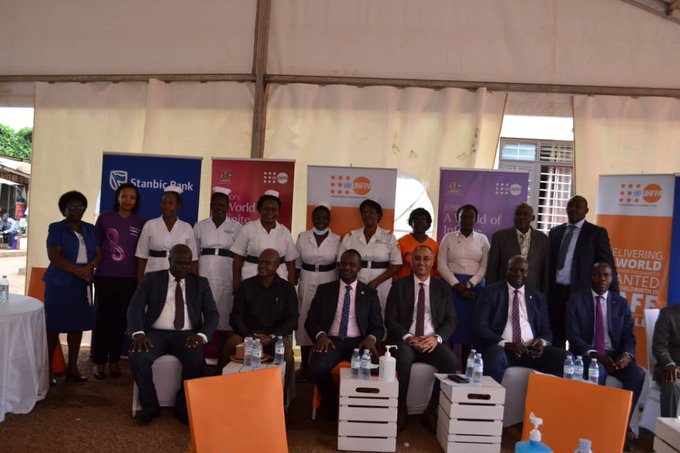The global population is projected to have reached 8 billion on 15 November 2022, according to the World Population Prospects 2022, released by the United Nations Department of Economic and Social Affairs.
In commemoration of the day, stakeholders in Uganda including the ministry of health, the United Nations Population Fund – UNFPA, and members of parliament held a conversation on population dynamics, sexual reproductive health issues and to ensure rights and choices for all at China-Uganda Friendship Hospital, Naguru.
Speaking at the event, Margret Muhanga – Minister of State for Primary Health Care noted that although the day presents a vital opportunity to draw the world’s attention to the infinite possibilities of humanity, it also comes with lots of challenges.
According to her, in Uganda, 4 out of 10 pregnancies are teenage mothers which calls for a collective role.
“Nearly half of women (48%) in Uganda who are pregnant didn’t intend to get pregnant. Uganda registers an estimated 629000 unintended pregnancies annually and an estimated 9% end up in unsafe abortions. This is really a big issue that we are dealing with as we celebrate the 8th billion baby,” said the minister who was represented by Dr Richard Mugahi – Assistant Commissioner in charge of Reproductive and Infant Health.
The trends according to her have far-reaching implications for generations to come.
She, however, noted that Uganda, being a country largely with young people, is an opportunity to harness to achieve better standards of living.
UNFPA Uganda Deputy Representative – Dan Alemu noted that as UN they mark milestone by celebrating the advancements in sexual and reproductive health that have enabled more women have children by choice not by chance, and more women delivering safely under skilled care.
“This day presents a vital opportunity to draw the world’s attention to the infinite possibilities of humanity to build the world we want, with sexual and reproductive health and rights for all at its core.”
“UNFPA is taking this opportunity to underscore the need to move the conversation from numbers to rights and choices, and to find solutions that benefit all people in a society, whether in a rapidly ageing population or in a high-fertility population, and result in a more just prosperous and sustainable world,” he added.
He noted that this is a success story, not a doomsday scenario in Uganda and world over today, maternal and infant mortality has declined and more people of reproductive health can access a family planning method of their choice to space and time their children.
According to the Uganda Bureau of Statistics Report (2021), the percentage of child births attended to by a skilled health professional has increased over the years, from 37% in 2001 to 73% in 2020
This, according to Mr. Alemu is a symbol of hard won progress in health and development, which should be recognized and celebrated improvements in maternal and child health mean that a baby born today in Uganda, is expected to live on average to at least 63 years, an increase of a decade in the last 40 years alone
“As UNFPA, we are emphasizing to the World, to Uganda and to communities about our Commitment, that every pregnancy is wanted, every child should be by choice not by chance, every child birth is safe, women should not die while giving life and should deliver in dignity.”
“As we know, the goal is not more or fewer people, but more and equal access to opportunities for people especially women and girls, and where we can all harness the infinite possibilities that may lead us all to achieving the Sustainable Development Goals,” he said.
Mr. Alemu also called for solutions to the challenges the global community is facing, noting that young people and women are still denied the fundamental right to make decisions over their bodies and futures, many adolescents, youth and women do not have access to healthcare and social protection, and are unable to complete quality primary and secondary education.
“We are also witnessing a national catastrophe unfolding with the high rate of teenage pregnancy, child marriage and female genital mutilation, all grave human rights violation depriving girls of their education, health, security and futures. As we mark the day of 8 billion, UNFPA calls for investment in sexual and reproductive health and rights as one of the most powerful accelerators of human progress delivering strong returns to economies and societies through lasting benefits for individuals and families.”
A mother of 8th billion baby born Nov 15 at Naguru hospital. Baby Elijah weighed 3kg
Anthony Akol – MP Kilak North constituency said that this population comes with a lot of problems for a country like Uganda where there is a lot of poverty.
“For the first time, we have witnessed people die of hunger. That means as the population increases, the problem is also increasing in the country. When you are driving in Kampala, you look at street kids begging, meaning the street is better than home. We have a duty to make sure our people get jobs, and to ensure that people are trained in technical skills to create jobs on their own.”
He is, however, optimistic that if well harnessed, high population comes with benefits because you have people who can buy goods and services you produce in a country.
Dr. Tugeineyo Emmanuel, Director China-Uganda Friendship Hospital, Naguru revealed that Uganda at independence was at around 4 million people, and by projections by 2050, it shall be having 100 million people.
This is attributed to high fertility rate of Ugandans.
Dr. Tugeineyo says that this to them as services providers because as the population is expanding, the resources are not.
“This causes a lot of stress on service delivery. The economists will say we are getting a bigger market but I think the quality of a population is more important than quantity.”

